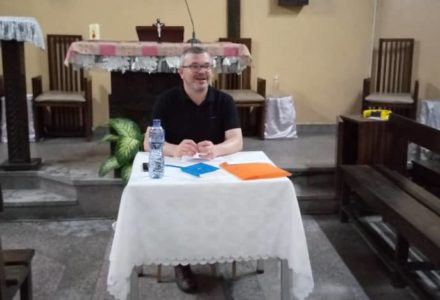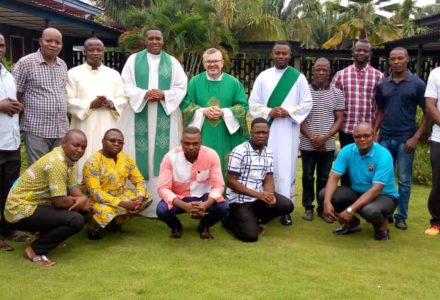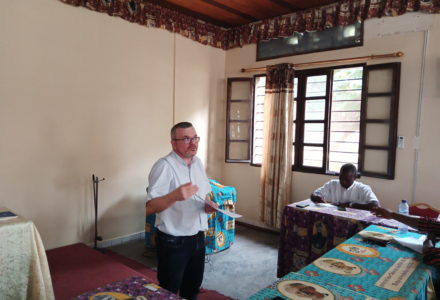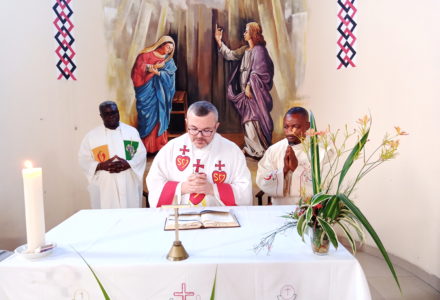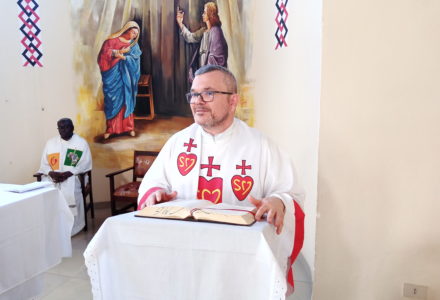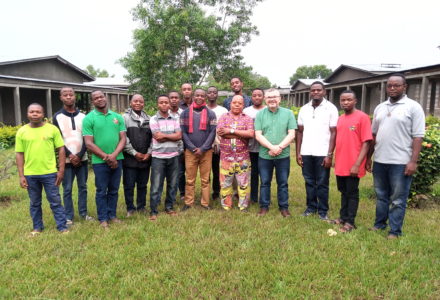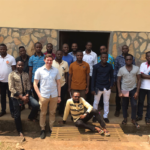A journey to our missionary roots: internship work in the RDC Province
"In the context of the Dehonian Scholarship program (BSD 2021-2023), I was sent for formative work in the RDC Province."
In the context of the Dehonian Scholarship program (BSD 2021-2023), I was sent for formative work in the RDC Province. This assignment – made at the end of 2022 – brought me enthusiasm and gratitude, because for me, during my initial formation period in Brazil, speaking of mission abroad meant above all referring to Zaire (the name of the Democratic Republic of Congo until 1997). The former BM province sent a considerable number of missionaries to the Central African country, and it was part of a seminarian’s formation to maintain contact with missionaries through letters.
I left on February 10, for a period of eleven days, staying in two cities: Kinshasa (the capital) and Kisangani (one of the three largest cities in the country and the cradle of the evangelization of upper Congo, through the apostolate of Bishop Grison).
The work consisted of a morning of reflection for the religious in Kisangani (where the majority of SCJs are), two days of formation for the Father Dehon Scholasticate (Kisangani), a day of formation for the Holy Family Sisters (Jamaa Takatifuu) and a morning of retreat for the House of Theology in Kinshasa. The topics we covered gravitated around Fr. Dehon’s faith experience (cf. Cst 2-5), such as Ecce Venio, sensitivity to sin and reparation.
The Monsignor Gabriel Grison Center in Kisangani is located next to St. Gabriel Parish. This starting point of Father Grison’s missions currently functions as a place of retreat and meetings. Thus, it is heir to the apostolic dynamics of the origins. Situated beside the Congo River, the celebration of Mass in the chapel of this apostolic landmark gives each Eucharist a strong missionary character. The visit to Monsignor Grison’s tomb made this stage into a pilgrimage because it helped me to contemplate the apostolic daring of the young congregation and the great importance that this mission had for the history of the Institute.
I must emphasize that a very special grace was to participate in the life of the province by visiting the houses of formation and social works. It was moving to participate in the ordination to the diaconate of Jean-François Otelasongo and of Benjamin Kizidila, and in the ordination to the priesthood of Félicien Ngampwo in Kinshasa.
I was particularly surprised by the formation at the Congregation of the Sisters of the Holy Family (Jamaa Takatifuu). This institute was born in 1937 through Msgr. Verfaillie, the Dehonian bishop who succeeded Msgr. Grison in Kisangani. Subsequently, Msgr. Wittebols gave many formation sessions to the young congregation based on central themes of Dehonian charism such as Ecce Venio, pure love and adoration. The young Blessed Clementina Anuarite Nengapeta, martyred in 1964 in the Simba’s Revolt, was part of this Institute.
Today, the congregation counts approximately eighty sisters and carries out an apostolate in the areas of education and health care in two cities: Kisangani and Bafwabaka (Wamba Diocese). Knowing the life, the apostolate, and the spirituality of these sisters helped me to perceive the fruitfulness of the charism entrusted to Father Dehon, because they knew how to prophetically acclimate the charismatic patrimony to local demands, showing that a gift of the Spirit always possesses a capacity to adapt to the social and ecclesial urgencies of a people, at the same time that it awakens new potentialities in each culture. I must recognize that the charismatic dynamic of the sisters of Jamaa Takatifuu has helped me to identify new potentials in our own spirituality.
Finally, I would like to express my gratitude to the various confreres who welcomed me during these days of pilgrimage, especially Fr Albert Lingwengwe (Provincial Superior), Fr Dieudonné Munia (Provincial Secretary), Fr Willy Samiay (Superior of the House of Philosophy), Fr. Antoine Twala Mawala (Procurator of the missions in Kinshasa) and Fr. Adolphe Litanda (Superior of the House of Theology). My gratitude also to the religious of the houses of philosophy and theology. I thank the Centro Studi Dehoniani and the General Government for this rich opportunity to immerse myself in the charismatic patrimony through service and apostolate.


